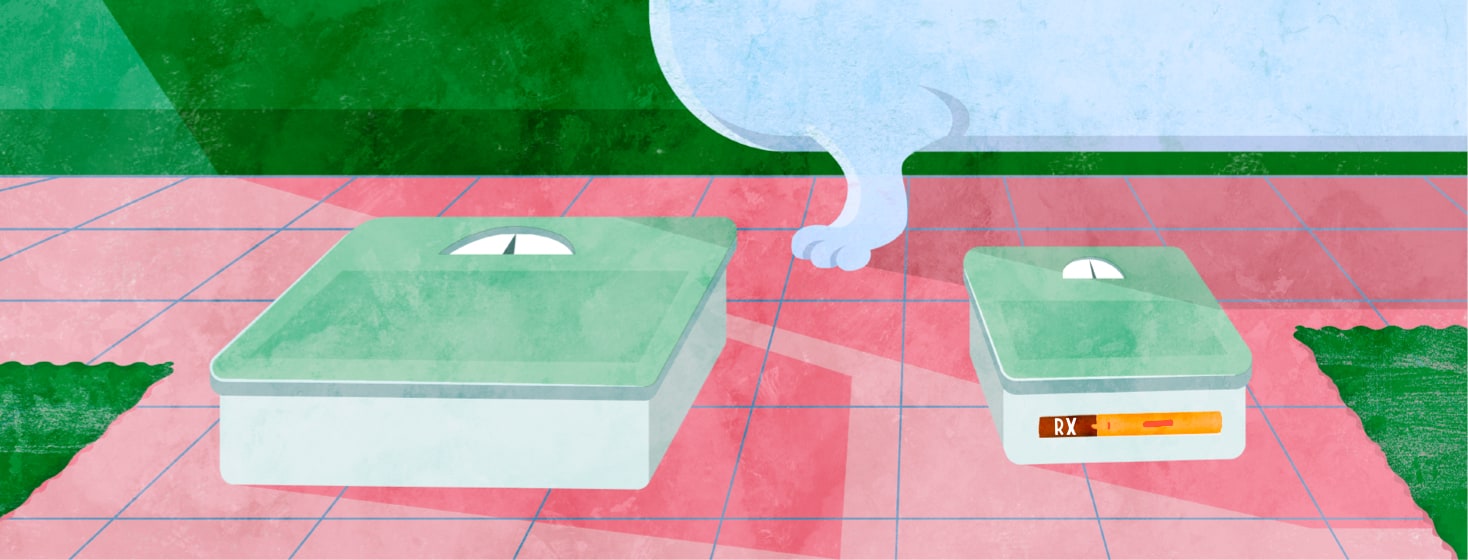What Happens When You Stop Taking GLP-1 Agonists?
Weight loss drugs known as GLP-1 agonists have grown in popularity recently. Brand names approved by the US Food and Drug Administration (FDA) include Ozempic® to treat type 2 diabetes and Wegovy® to treat obesity. If you have diabetes or struggle with weight loss, these medicines can be very effective. But side effects and access limitations prompt some users to stop taking them.1
Researchers continue to study the benefits and risks of GLP-1 agonists, including what happens if you go off of them. Some studies show that once the drugs are stopped, people tend to regain some or most of the weight they lost while taking them. But maintaining healthy lifestyle changes like regular exercise and meal planning can help keep the weight from coming back.1
How do GLP-1 agonists work?
One common active ingredient of GLP-1 agonists is semaglutide. Semaglutide is a glucagon-like peptide-1 (GLP-1) receptor agonist. This means it mimics the GLP-1 hormone, which is released by the gut after eating. This hormone affects appetite and reward.1
Mimicking the GLP-1 hormone has the effect of curbing hunger. It also balances blood sugar, which is why it helps with diabetes. People feel fuller sooner because it slows down digestion.1
Are you meant to take GLP-1 agonists long-term?
Researchers and doctors consider GLP-1 agonists safe for long-term use. They actually recommend extended use for chronic obesity, weight loss, and diabetes.2
This or That
Have you ever tried a GLP-1?
Why would you stop taking a GLP-1 agonist?
Despite their effectiveness, GLP-1 agonists also have risks. Many people report that the side effects outweigh the rewards. The most common side effects include:1
- Nausea
- Vomiting
- Diarrhea
- Stomach upset
In other cases, people may lose access to the drugs due to insurance, cost, and availability. Manufacturers have had a hard time keeping up with demand. For this reason, some doctors offer the drug only on a trial basis, or insurance may cover only a limited supply.1
Also, some people have to stop these drugs because federal or state insurance will not cover them. Currently, Medicare does not cover anti-obesity medicines for weight management in the United States.2
In other cases, people do not experience significant weight loss on these drugs. Researchers recommend stopping a GLP-1 agonist after a few months if it is not working.2
Will you regain weight if you stop?
Once people stop taking this type of drug, they often regain weight. Our bodies naturally try to stay at a set weight point, and old habits can return.1
In 1 extended semaglutide trial, participants lost an average of 17.3 percent of their body weight after more than a year on the drug. But they regained about two-thirds of that weight after 1 year off of the drug.3
Studies have also found that after stopping the drug:1
- Waist circumference increases, which can lead to fatty liver or heart disease
- Blood pressure, blood glucose, and cholesterol levels rise
- Other metabolic problems return, such as heart disease and insulin resistance
Overall, people who started a GLP-1 agonist and then stopped it still had a lower body weight compared to their baseline a year or 2 later. Some metabolic variables that improved on the GLP-1 agonist remained stable after stopping it. But some got worse.3
Are there any withdrawal symptoms?
Many people wonder whether the drugs are safe to quit cold turkey. Researchers believe there is no harm or withdrawal symptoms if you stop them abruptly.2
However, some people have reported more hunger after quitting GLP-1 agonists. Slowly reducing the dose might help with rebound hunger. People also should monitor their appetite, weight, or any other concerns while on and off the drug.2
Can you prevent weight gain?
Lifestyle factors play a big role in weight management and metabolic changes. Tips to help prevent weight gain include:4
- Keep up your exercise routine and stay active.
- Eat a balanced diet of whole grains, vegetables, fruits, healthy proteins (like nuts, fish, and poultry), and plant oils (like olive oil).
- Eat slowly and limit distractions while eating.
- Try to get 7 to 8 hours of sleep per night.
- Combat stress through physical activity and mind-body exercises such as yoga.
If you need help, you can seek help from an obesity specialist. You might also work with a personal trainer and registered dietitian to help you develop a plan and stick to it. Your doctor can help you rule out any underlying causes of weight gain.
GLP-1 agonists for weight loss are meant to be taken long-term for weight loss and maintenance for people with type 2 diabetes or obesity. Starting and stopping these drugs is not recommended. Be prepared to regain some weight if you go off it. And remember that healthy habits add up!

Join the conversation